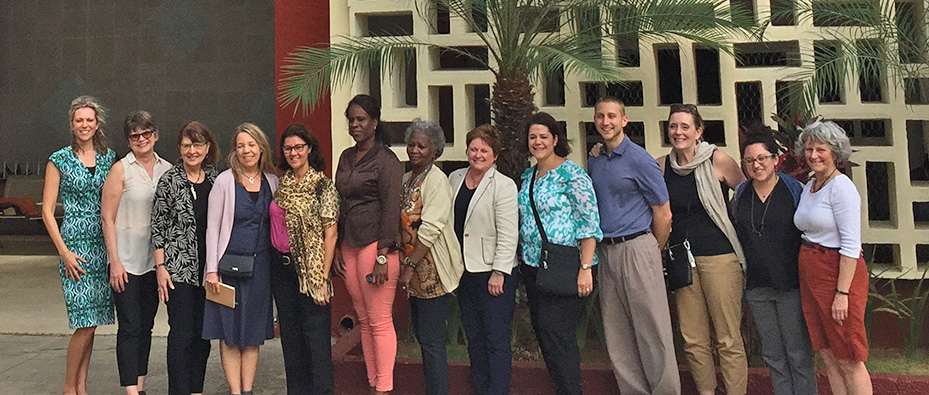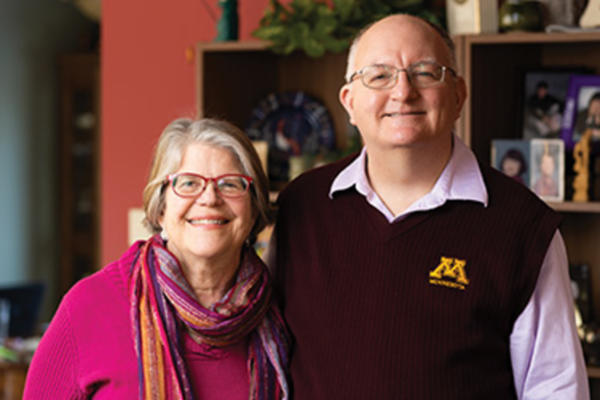Partnering for Health
(April 2021) An interdisciplinary group of academic and practice partners, including leaders from the University and M Health Fairview, visited Cuba in 2019 to learn from its health care model.
April 7, 2021
Steve Rudolph

“We light the oven so that everyone may bake bread in it.”
Clinical Professor Teddie Potter, PhD, RN, FAAN, shared this quote from Cuban poet and national hero Jose Marti in her opening remarks of the Understanding COVID-19: Minnesota-Cuba Innovations & Research virtual forum in December. She added that the forum was being offered, “as a way of lighting the oven in the hope that shared information may decrease suffering and improve the health and wellbeing of Minnesotans and Cubans.”
The Zoom webinar, featuring nationally and globally-recognized experts, was supported by Dean Connie Delaney, PhD, RN, FAAN, FACMI, FNAP, who joined an interdisciplinary group of academic and practice partners, including leaders from the University and M Health Fairview, during a visit to Cuba in 2019 to learn from its health care model.
That 2019 trip and two subsequent Global Health experiences in Cuba courses offered by the School of Nursing and led by Potter have established numerous friendships and partnerships, including one with Gail Reed, executive editor of the journal MEDICC Review. Reed moderated the webinar from Havana where she was joined by Cuba’s National Director of Epidemiology and National Director of Science and Technology Innovation for the Ministry of Health. Potter credited Reed’s significant cross-sector relationships in Cuba as key to facilitating such an impressive panel of presenters and making the virtual event so successful.
Another key partner has been Adjunct Assistant Professor John Oswald, PhD, of the University’s School of Public Health. Oswald has researched maternal mortality in conjunction with the Cuban Society of Public Health and has been sharing his insights on Cuba with Potter for several years. The two recognized the opportunity the pandemic presented for facilitating a discussion about how population health expertise in Cuba was contributing to lower infection and deaths rates and approached Reed with the concept of the virtual forum.
During the forum, Michael Osterholm, PhD, Regents professor of Public Health and director of the Center for Infectious Disease Research and Policy, provided an overview of COVID in Minnesota, while Francisco Durán, MD, national director of Epidemiology Cuba, provided one for Cuba.
Jakub Tolar, PhD, MD, dean of Medical School and vice president for Clinical Affairs, and Ileana Morales Suarez, MD, MS, national director of Science and Technology Innovation for the Ministry of Health, shared their insights related to schools and universities.
Dagmar García, director of research at Finlay Vaccine Institute, and Tim Schacker, MD, vice dean for research at the University of Minnesota Medical School, discussed clinical trials and vaccines.
Daniel González, MD, director of Clinical Care Tropical Medical Institute, and Laura Reed, DNP, RN, chief nursing executive and chief operating officer, M Health Fairview, shared their insights regarding clinical care during and after COVID-19.
All the parties hope the forum will become the foundation of much deeper partnerships in education, research and service. University President Joan T.A. Gabel, JD, echoed this in her remarks. “My hope is that this forum opens the door for future engagement and learning,” says Gabel.
Planning is already underway for a virtual conversation on COVID-19 vaccination programs, including learnings from prioritization and rollouts. Cuba has one of the best national vaccination rates in the world and their model can offer insights for vaccine roll out in the United States. Early discussions have also begun to host Cuban leaders in Minnesota to expand the interaction to other health science leaders at the University and across the state.
“The long-term goal is to foster and promote relations with health care leaders from a nation with population-based health care expertise that can inform the redesign of a U.S. system that is not sustainable or equitable,” says Potter.
Partnering for health is a recurring feature that highlights a school partnership working to advance health care to improve the health and wellbeing of all.


